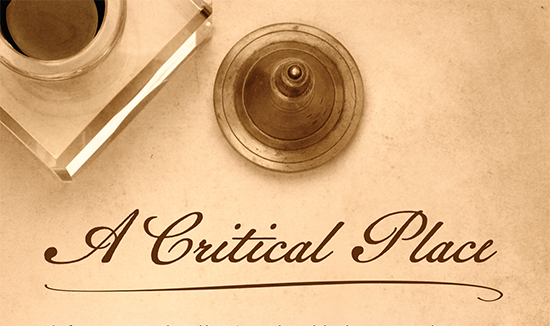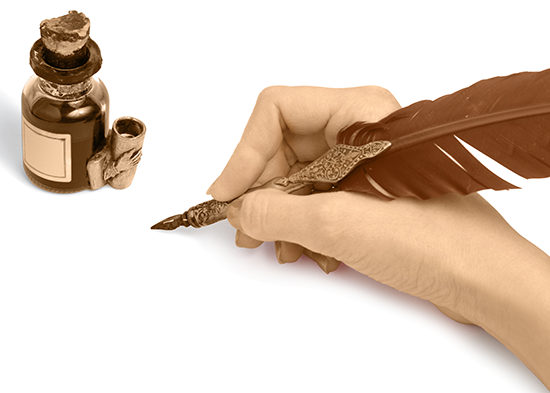




Hanna Dow and the memoirs of nineteenth century women missionarries...
A Critical Place
By Phillip Morgan
The first entry in Hannah Gould Dow’s journal records her decision to enter the mission field. On June 17, 1843, having found out that her fiancé J. C. Dow had been approved by the Freewill Baptist Board of Foreign Missions to serve as a missionary in India, she wrote, “I am now placed in a critical place. The question is, ‘Shall I go or not?’” [1] Like a growing number of young New England women, Hanna answered in the affirmative.
In 1811, Ann Judson, Harriet Newell, and Roseanne Nott were the first American women commissioned to enter the mission field with their husbands. Newell died after giving birth less than a year after her commissioning, but her journal and letters were collected, edited, and published by Massachusetts minister Leonard Woods. The resulting memoir was an instant success, especially among young evangelical women who revered Newell as a modern martyr and paragon of female virtue. [2]
The popularity of Newell’s memoir led to similar publications. By 1870, at least 27 posthumous memoirs of women missionaries had emerged in the English language. [3] Historian Ashley E. Moreshead has noticed that, after Newell’s memoir, missionary women began writing their journals and letters in the “established convention” of a missionary memoir. [4] Moreshead argues this similarity in style reflects the burgeoning independence of women in the early 19th century manifested in women’s engagement with reading, education, and public vocation. This spirit of independence took shape in acts of social benevolence, including teaching, engagement in public debates, and involvement in missions.
Dow’s journal and letters exhibit many of the characteristics Moreshead has identified. In this way, Dow serves as a window into the Randall Movement’s early compromises with Enlightenment egalitarianism that would eventually lead them into Protestant Liberalism. [5] However, Dow also complicates Moreshead’s thesis by also exhibiting pre-modern sensibilities. Thus, Dow truly holds “a critical place” as American society shifted from pre-modern (pre-industrial) beginnings into the modern industrial world.
Goody Dow
As historian Laurel Thatcher Ulrich has shown, women in pre-modern New England had fuller lives than often imagined. In fact, Puritan women and their descendants were integral, active members of the family unit and led happy, fulfilled lives. Beyond keeping house and raising children, many women took part in managing the family business and earned extra money through weaving, mending, washing clothes, selling salvage items, and serving as midwives and wet nurses. A woman who fully exhibited these qualities was known as a good wife and might be referred to as Goody.
Like most pre-modern women, Dow received training in the art of housewifery from her mother. Ulrich has argued well that fulfilling this responsibility required “judgement and skill.” [6] Dow’s refined skills were tested by her missionary life. Before leaving Boston, she had to sew special Indian style clothing from written instructions sent to her by a former missionary to India. While in transit, she tried her best to keep their cabin clear of the countless rats that chewed holes in their possessions and dragged items around the room.
Once in India, Dow saw ministering to her family as her primary responsibility and began setting up a home while J. C. ministered. As historian Dana L. Robert has pointed out, nineteenth-century women missionaries led significantly different lives based on the context of the mission field. In places with few missionaries, women like Ann Judson were active evangelists, teachers, and translators. However, in areas where a significant number of missionaries were active, women like Goody Dow devoted their energy to caring for their families through the traditional forms of housewifery. [7]
Reading Woman
Moreshead argues reading was an important characteristic of emerging female individualism in the early nineteenth century. However, this point should be clarified. Puritan women and their descendants in New England were usually literate because Puritans believed everyone should read the Bible. [8]
However, very few Puritans would have read anything besides the Bible, devotional, or theological works. That changed in the early 19th century when New England women began engaging classical and modern texts obtained more easily as America ceased to be a colonial frontier. [9]

The Dows must have had a fondness for reading, since they took at least two boxes of books to India. [10] Yet Hannah never mentioned reading anything but the Bible. Her only direct quotations from extra-biblical works were from hymns. Perhaps this is one of the vestiges of pre-modernism in Dow’s life. Or this could reflect her revivalist, evangelical piety that avoided books not directly related to some spiritual theme. [11] Either way, such ambiguities complicate Moreshead’s modern independent woman typology.
The Modern Woman
Dow’s complexity deepens when other aspects of her life are included in her portrait. Moreshead is right to argue women’s lives were changing significantly during the early 19th century. Between the War for Independence and the War Between the States, women’s education expanded exponentially in America, especially in New England. As industrialization expanded, more women received opportunities to further their education than ever before. Seminaries offered the equivalent of a high school education. Then, beginning with Mount Holyoke College (founded in 1837), an array of institutions began to offer college education to women. Perhaps as a consequence of increased educational and vocational opportunities, women also founded other social structures such as temperance, suffrage, abolitionism, and missionary societies.
These institutes of higher learning proved to be important centers for developing women missionaries. Newell, Judson, and many others extolled their education for preparing them intellectually and spiritually for the tasks they faced as missionaries. Their memoirs celebrated the importance of advanced education in a seminary or college, while simultaneously presenting the missionary life as a socially acceptable vocation for such highly educated women. [12]
Dow also extolled education, though she doesn’t seem to have attended a seminary or college. Still, she was intelligent and while still a teenager had begun to teach younger children reading, writing, basic grammar, and mathematics. Either she or her husband knew Latin and copied or wrote two poems preserved in her journal.
Dow’s most direct statement about education came in a letter to her younger brothers and sisters, written as she crossed the rolling Atlantic. She urged them to take their education seriously because it would “fit [them] for any station in life and without it [they could] fill no station well.” [13] Most of all, she wanted them to study the Bible for the truths necessary for life. [14] Still, Dow didn’t follow other women missionaries in linking education’s value to a spiritual vocation, even for women. Rather, she argued a good education was necessary to fill any “station in life” well.
Teaching was probably the most popular and socially acceptable vocation for educated women of the early 19th century. [15] Dow was preparing to teach when she decided to marry her instructor and join him on the mission field. Like her, most female missionaries served as schoolteachers in some capacity before entering the mission field.
The emerging independence of women was most clearly demonstrated in their changing familial relationships. In pre-modern America, only widows could engage in public business without the consent of a husband or father. [16] During the nineteenth century, this began to change.
In 1843, while still unmarried, Dow decided to go to the mission field without consulting her family. She surprised them with the information a few days before marriage. Only 25 years earlier, Ann Judson’s experience was much different. She refused to accept Adoniram’s offer of marriage or the life of a missionary without the consent of her father. [17]
Dow’s willingness to flatten social structures also carried over into other areas. Unlike the three other missionary couples that sailed on their ship, she advocated for women speaking and praying publicly in church. She and J.C. also differed from their fellow passengers by becoming friendly with black crewmembers of the ship, teaching them to read and write.
Complex Conclusion
Hannah Dow provides a glimpse into the increasingly complex life of a 19th century woman with a foot in two worlds. Raised in a world still dominated by pre-modern sensibilities, she also exhibited modern tendencies. As a faithful servant of God, she willingly became one of the earliest female missionaries to India. Though her missionary work was largely as a housewife, making and managing a home for her family in a strange land, she also advocated for women to have more public roles in Christian worship. She had a limited education, but the social issues of her day also interested her. By accepting her identity in this “critical place,” she helps us better understand the shifting social tectonic plates of the nineteenth century.
About the Writer: Phillip T. Morgan is curator of the FWB Historical Collection housed at Welch College, where he additionally serves as History Program coordinator and professor. Phillip, His wife Megan, and two children Isaiah and Julia live on a small farm in Robertson County, Tennessee. Article reprinted by permission from helwyssocietyforum.com.
1 Unless noted otherwise, all information regarding Hannah Dow
is derived from Hannah G. Dow, Hannah G. Dow (unpublished journal, 1843-47), “December 26, 1843,” 20 (National Association of Free Will Baptist Historical Collection, Welch College Library, Gallatin, Tennessee).
2 Ashley E. Moreshead, “Beyond All Ambitious Motives: Missionary Memoirs and the Cultivation of Early American Evangelical Heroines,” Journal of the Early Republic 38, no. 1 (Spring 2018): 37.
3 Ibid. 38.
4 Ibid. See also Mary Kelley, “’Pen and Ink Communion’: Evangelical Reading and Writing in Antebellum America,” New England Quarterly 84, no. 4 (December 2011): 556-57.
5 Egalitarianism refers to the social philosophy that advocates the removal of all inequalities (social, economic, and political).
6 Ibid., 20.
7 See Dana L. Robert, “Evangelical or Homemaker? Missions Strategies of Early Nineteenth-Century Missionary Wives in Burma and Hawaii,” in North American Foreign Missions, 1810-1914: Theology, Theory, and Policy, ed. Wilbert R. Shenk (Grand Rapids: Eerdmans, 2004), 116-32.
8 Some historians suggest 17th century literacy rates among some Puritan congregations could have been as high as 98%. See James Robert Coggins, John Smyth’s Congregation: English Separatism, Mennonite Influence, and the Elect Nation (Waterloo, Ontario: Herald, 1991), 31.
9 See Mary Kelley, “Reading Women/Women Reading: The Making of Learned Women in Antebellum America” Journal of American
History 83, no. 2 (Sept. 1996): 401-24.
10 Hannah Gould Dow to J. C. Dow, November 10, 1846. Correspondence between J.C. and Hannah Dow, Missionaries to India (National Association of Free Will Baptist Historical Collection in Welch College Library, Gallatin, Tennessee).
11 Kelley, “’Pen and Ink Communion,’” 574.
12 Moreshead, 47.
13 Hannah Gould Dow to siblings, December 19, 1843. Correspondence between J.C. and Hannah Dow, missionaries to India (Historical Collection of the National Association of Free Will Baptists in Welch College Library, Gallatin, Tennessee).
14 Ibid.
15 Twenty percent of New England women were entering this profession by mid-century. Kelley, “Pen and Ink Communion,” 565.
16 Ulrich, 23-24.
17 Jesse Owens, “Adonirum Judson: Pioneering Missionary to Burma” Helwys Society Forum: www.helwyssocietyforum.com
|

